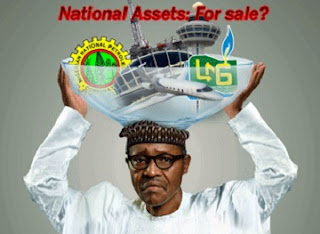 |
| Photo Credit: VANGUARD NEW |
He described them as unpatriotic and enemies of Nigeria.
In an interview with Daily Sun in Ibadan, David-West said the clamour showed lack of understanding of the current economic quagmire. The former petroleum minister, who described oil and gas sector as the blood of the nation, said the clamour for outright selling of Nigeria Liquefied Natural Gas (NLNG), the country’s shares in the company or the refineries was a wrong way to tackle the economic recession.
Business mogul, Alhaji Aliko Dangote recently called for the sale of the nation’s shares in the NLNG. His suggestion received a buy in from the Senate President, Dr. Bukola Saraki who said the shares, along with other sovereign assets in the oil and aviation sectors be sold to stem the current economic recession.
But while David-West agreed that the country was in a desperate situation, he said the leadership should not be desperate towards providing solution to the challenges.
“It’s madness to say you want to sell NLNG and the refineries. Why not say Nigeria, too, should be sold?
“Yes recession is biting, and it is a desperate situation. But, anyone who acts desperately in a desperate situation will be in more trouble. If you have a desperate situation, don’t act desperately. When you act desperately, you are going to make more mistakes.
“In any case, oil and gas are strategic national assets, so, anyone who talks about selling them is unpatriotic. Oil makes up 90 percent of Nigerian foreign earnings. About 80 percent of our annual budget in this country is from oil. Oil is the life blood of Nigeria. Anyone that says go and sell oil asset, which is a strategic asset, is not patriotic, or does not understand what he’s talking about. If you want to destroy Nigeria, go and tamper with oil industry; we are finished.
“There have been talks about selling of national assets, such as NLNG, refineries and so on. When I read the stories, I shuddered for the lack of basic understanding of what is on ground. You cannot sell NLNG because it is an incorporated company. Nigeria is only a shareholder in that company. If you talk about selling our shares, it is a different thing. No government can sell NLNG. It is a company where Nigeria and other people have assets,” he said.
Nigeria, according to him, can get out of the recession by leasing oil blocs that have not been developed to the maximum and those that have not been touched. He added that Nigeria could get loans that should be repaid with crude oil over a period of time. He recalled that it was done when Buhari was Head of State in 1984, “and it can also be done now.”
David-West noted that in his letter of appointment as a minister in 1984, the military regime of Gen. Muhammdu Buhari gave him three priority areas, namely, revival of the NLNG, revival of petrochemical and reorganisation of the Nigeria National Petroleum Corporation (NNPC). The mandate, he said, was given to him because the NLNG had failed before Buhari’s regime came on board.
“Why did it fail? Nigeria had spent over $80 billion on wasted NLNG projects before the coming of Buhari. Why was it wasted? Every ministry had representatives on the board of NLNG, which had 25 members. “During Buhari’s time, we changed the concept. What they were doing before that time was, ‘NLNG belongs to us’. You can come and join us to develop it. Nonsense! No businessman will invest in a venture that he is not sure his investments are safe and he will make profits. So, we changed the concept,” he said.
David-West, who noted that he appointed the late boardroom guru, Gamaliel Onosode, as chairman of NLNG in 1984, stated that the regime of Buhari restored the confidence of international investors in the company. Part of the transformation introduced to the company, according to him, was the change in the concept. Nigeria was made a partner and it has bigger shares of 49 percent through NNPC; but the country does not have controlling shares in NLNG. The Shell Petroleum, which was taken as principal technical partner has 25 per cent, and other international companies like the AGIP, Total and so on own 26 percent.
He further said the word ‘sales’ should not come into the question. Instead, he suggested that the country should think about leasing some of the national assets to reliable investors. He sug-gested that the leases should be for a period of 20 years.
“There is difference be- tween freehold and lease- hold. When you sell your property, it is freehold; you will lose your ownership and the buyer will now be
the owner. But in leasehold, you can start the lease for 20 years. At the end of 20 years, it goes back to the owner; you can re-negotiate. You are still the owner of your property. I don’t want the use of the word ‘sell’ at all. Sell is completely out of the question. Nobody sells his crown jewel.
No comments